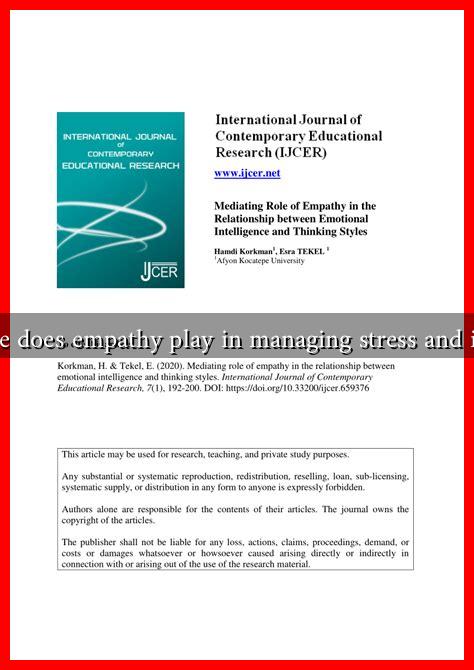-
Table of Contents
What Role Does Empathy Play in Managing Stress and Intimacy?
Empathy, the ability to understand and share the feelings of others, is a powerful tool in navigating the complexities of human relationships. It plays a crucial role in managing stress and fostering intimacy, two elements that significantly impact our emotional and psychological well-being. This article explores how empathy influences stress management and intimacy, supported by research, examples, and practical insights.
The Connection Between Empathy and Stress Management
Stress is an inevitable part of life, but how we respond to it can vary greatly. Empathy can serve as a buffer against stress, both for ourselves and for those around us. Here are some ways empathy contributes to stress management:
- Emotional Support: When we empathize with others, we provide emotional support that can alleviate their stress. A study published in the journal Psychoneuroendocrinology found that individuals who received empathetic support reported lower levels of cortisol, the stress hormone.
- Improved Communication: Empathy enhances communication, allowing individuals to express their feelings and concerns more openly. This can lead to quicker resolutions of conflicts, reducing stress levels.
- Increased Resilience: Empathetic individuals often develop stronger coping mechanisms. They are more likely to seek help and support from others, which can mitigate feelings of isolation and stress.
For example, a case study involving healthcare professionals showed that those who practiced empathy were better equipped to handle the emotional toll of their work, leading to lower burnout rates and improved job satisfaction.
Empathy and Intimacy: Building Stronger Connections
Intimacy, whether emotional or physical, is essential for healthy relationships. Empathy is a cornerstone of intimacy, as it fosters understanding and connection between partners. Here’s how empathy enhances intimacy:
- Deepened Understanding: Empathy allows partners to understand each other’s feelings and perspectives, creating a deeper emotional bond.
- Trust Building: When individuals feel understood and validated, trust is established. This trust is vital for intimacy, as it encourages vulnerability.
- Conflict Resolution: Empathetic communication can help resolve conflicts more effectively, preventing resentment from building up and damaging the relationship.
A study published in the journal Personality and Social Psychology Bulletin found that couples who practiced empathy reported higher levels of relationship satisfaction and intimacy. This highlights the importance of empathy in maintaining healthy, fulfilling relationships.
Practical Strategies to Cultivate Empathy
While empathy is a natural human trait, it can be cultivated and strengthened through practice. Here are some strategies to enhance empathy in your life:
- Active Listening: Focus on truly hearing what others are saying without planning your response while they speak.
- Put Yourself in Their Shoes: Try to imagine how the other person feels in their situation. This perspective-taking can deepen your understanding.
- Practice Mindfulness: Being present in the moment can help you connect more deeply with others’ emotions.
- Engage in Empathetic Conversations: Discuss feelings and experiences openly with friends or partners to foster a deeper emotional connection.
Conclusion
Empathy is a vital component in managing stress and fostering intimacy in relationships. By understanding and sharing the feelings of others, we can provide emotional support, improve communication, and build trust. The benefits of empathy extend beyond individual relationships, contributing to a more compassionate society. As we cultivate empathy in our lives, we not only enhance our own well-being but also create a supportive environment for those around us. In a world where stress and disconnection are prevalent, empathy stands out as a powerful antidote, reminding us of our shared humanity.

